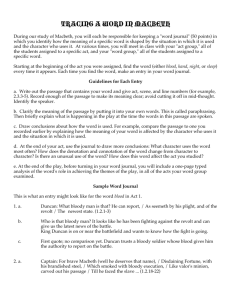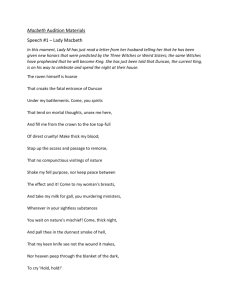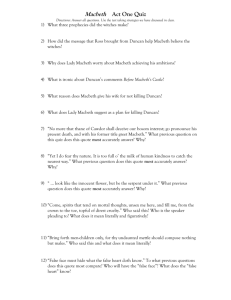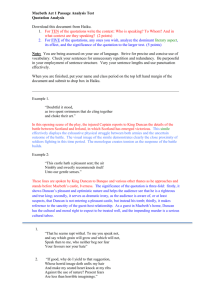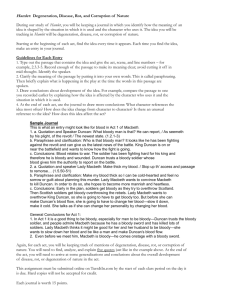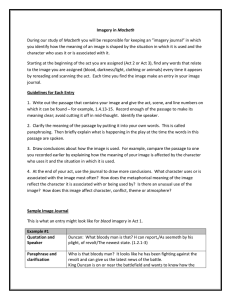Tracing a Word in Macbeth
advertisement
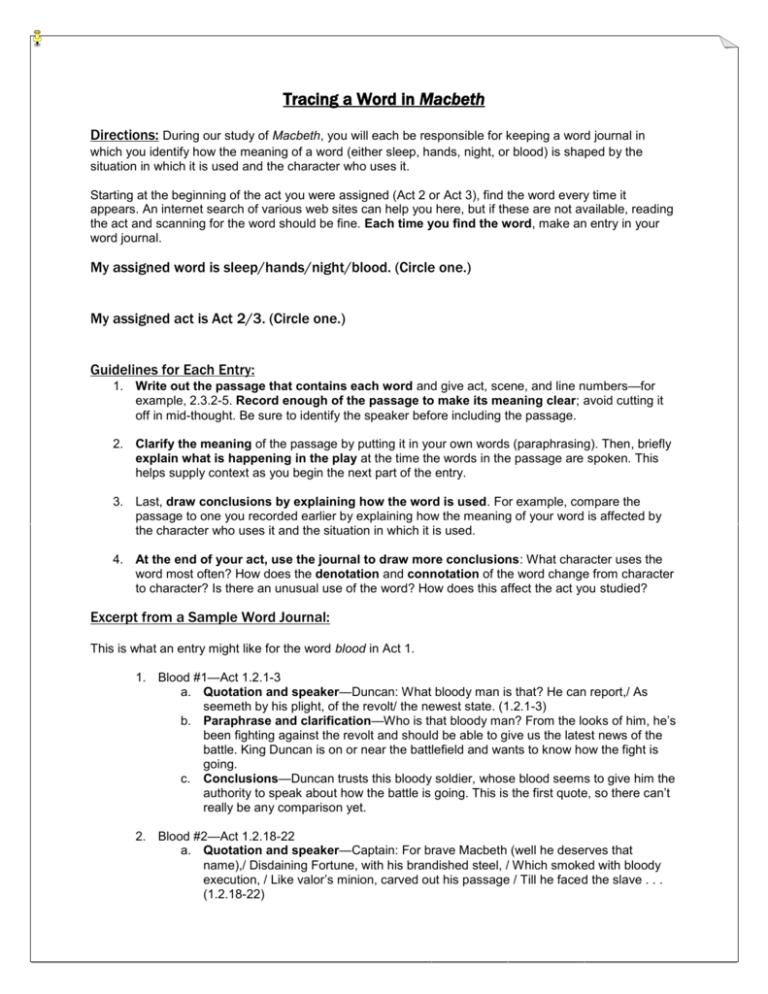
Tracing a Word in Macbeth Directions: During our study of Macbeth, you will each be responsible for keeping a word journal in which you identify how the meaning of a word (either sleep, hands, night, or blood) is shaped by the situation in which it is used and the character who uses it. Starting at the beginning of the act you were assigned (Act 2 or Act 3), find the word every time it appears. An internet search of various web sites can help you here, but if these are not available, reading the act and scanning for the word should be fine. Each time you find the word, make an entry in your word journal. My assigned word is sleep/hands/night/blood. (Circle one.) My assigned act is Act 2/3. (Circle one.) Guidelines for Each Entry: 1. Write out the passage that contains each word and give act, scene, and line numbers—for example, 2.3.2-5. Record enough of the passage to make its meaning clear; avoid cutting it off in mid-thought. Be sure to identify the speaker before including the passage. 2. Clarify the meaning of the passage by putting it in your own words (paraphrasing). Then, briefly explain what is happening in the play at the time the words in the passage are spoken. This helps supply context as you begin the next part of the entry. 3. Last, draw conclusions by explaining how the word is used. For example, compare the passage to one you recorded earlier by explaining how the meaning of your word is affected by the character who uses it and the situation in which it is used. 4. At the end of your act, use the journal to draw more conclusions: What character uses the word most often? How does the denotation and connotation of the word change from character to character? Is there an unusual use of the word? How does this affect the act you studied? Excerpt from a Sample Word Journal: This is what an entry might like for the word blood in Act 1. 1. Blood #1—Act 1.2.1-3 a. Quotation and speaker—Duncan: What bloody man is that? He can report,/ As seemeth by his plight, of the revolt/ the newest state. (1.2.1-3) b. Paraphrase and clarification—Who is that bloody man? From the looks of him, he’s been fighting against the revolt and should be able to give us the latest news of the battle. King Duncan is on or near the battlefield and wants to know how the fight is going. c. Conclusions—Duncan trusts this bloody soldier, whose blood seems to give him the authority to speak about how the battle is going. This is the first quote, so there can’t really be any comparison yet. 2. Blood #2—Act 1.2.18-22 a. Quotation and speaker—Captain: For brave Macbeth (well he deserves that name),/ Disdaining Fortune, with his brandished steel, / Which smoked with bloody execution, / Like valor’s minion, carved out his passage / Till he faced the slave . . . (1.2.18-22) b. Paraphrase and clarification—In spite of our troops’ bad luck, brave Macbeth carved his way with his executioner’s sword through all of the ranks of the rebel soldiers until he faced the traitor who led the revolt. The captain reports to King Duncan that Macbeth fought fiercely to spill the blood of traitors who rebelled against Duncan and Scotland. c. Conclusions—In the first passage, the loyal Scottish captain is bloody because of the rebels’ uprising. This time, Macbeth inflicts the blood on the rebels, making them bloody showing his bravery, fierceness, and loyalty. 3. Blood #3—Act 1.5.50-51 a. Quotation and speaker—Lady M: Make thick my blood. / Stop up th’access and passage to remorse . . . (1.5.50-51) b. Paraphrase and clarification—Make my blood thick so that I can be cold-hearted and feel no sorrow or guilt about planning this murder. Lady Macbeth wants to convince Macbeth to kill Duncan. In order to do so, she hopes to become more mannish and heartless. c. Conclusions—Early in the play, soldiers get bloody as they try to overthrow Scotland or defend it from rebels trying to overthrow the king. Lady M wants to overthrow King Duncan as well so that Macbeth will be king, so she is going to have to be bloody as well. Before she can make Duncan’s blood flow, however, she has to change her own blood—making it slow down, making it cold. She talks as if she can change her personality by changing her blood. 4. General Conclusions for Act I: (IRE paragraph—with a thesis—about how blood is used in the Act) Throughout Act 1 being bloody or shedding blood appears to be a good thing, especially for men. One example of this appears at the very beginning of the act as we meet the captain who reports to Duncan. His very bloodiness gives him the authority to report how the battle is going and shows his bravery. Duncan trusts him and his news because he has earned that respect through bodily harm in the service of the king. Macbeth is also one who shows bravery through the shedding of blood, this time the blood of rebels. Before we even get to see him on stage, we know that his sword is used in defense of the king so much that it “smokes with bloody execution” (1.2.19). Macbeth’s character is shown through the way he uses his sword—with skill and discernment. Lady Macbeth wishes for her blood to be more like the men’s so that she can be brave enough to create a plan to kill Duncan. She worries that her if her blood is too thin and hot that she will be unable to carry out the plan. She needs to be cold-blooded and hard-hearted in order to kill a man that they’ve been loyal too. So far in the play, blood’s connotation has been positive, showing bravery, although the Lady Macbeth’s use of the word seems to show that the meaning may be changing for Act 2.
